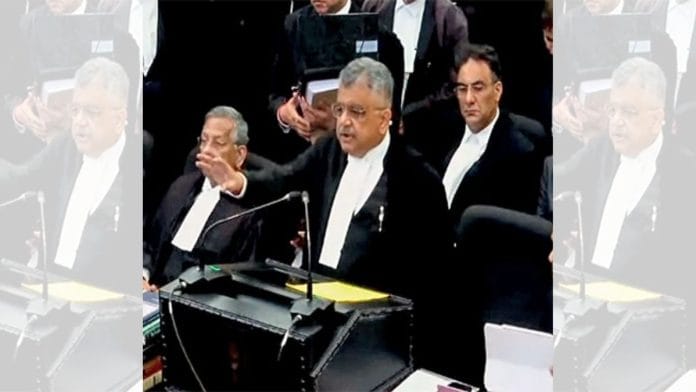New Delhi: Opposing stay of the Waqf (Amendment) Act, 2025, BJP-led central government Wednesday refuted the petitioners’ allegations that the law in its modified form intends to capture the property of Muslims.
Solicitor General Tushar Mehta opened his argument in defence of the law in the Supreme Court and negated the petitioners’ “misleading” arguments by clarifying that the Centre can unilaterally take over waqf land.
Mehta also said waqf is not an essential practice of Islam since charity is practiced in all religions. Further, he shed light on the role of the state waqf boards, saying they discharge a secular function, unlike the boards managing Hindu endowments. In light of different roles performed by them, it was inappropriate to compare the state waqf boards with the Board of a Hindu Endowment.
Mehta advanced his arguments before a bench led by Chief Justice of India B.R. Gavai and comprising Justice Augustine Masih, which Tuesday informed the petitioners that a law, which otherwise is presumed to be legal, is stayed if there is a prima facie case that its operation is capable of causing irreversible harm to those opposing it.
Through his arguments, Mehta sought to allay the apprehension raised by the petitioners over takeover of waqf land, particularly with regard to section 3C that says a property shall not be treated as waqf if a claim is made that it’s government land. The petitioners have claimed that a property will cease to be a waqf till a designated officer, who is an arm of the government, completed enquiry on the status of the land.
Regarding this, Mehta said that this proviso only means that an entry will be made in the revenue records. This, he added, has nothing to do with the question of title, which will be only determined by the court.
“The only consequence is revenue records will be corrected…The argument repeated by them is that this provision allows the wholesale takeover of the waqf. It is misleading. Designated officer is not making a final determination of property; only the revenue records will be updated. It is only that through revenue records, it will come to notice that the property belongs to the government… It will be open for affected parties to approach the waqf tribunal, final determination of title would be decided by tribunal or in appeal by the High Courts,” Mehta submitted, ruling out the petitioners’ suggestion that amendments to the 1995 Act would allow the Centre to unilaterally take over waqf land.
When CJI Gavai pointed out that according to the picture painted by the petitioners, the property will not be waqf until the inquiry is over, Mehta said it was a “false and misleading narrative”.
“It will be a paper entry. But if the government wants ownership, it will have to file a suit for title,” he explained.
When CJI Gavai asked if the property could be alienated in such a scenario, Mehta said it cannot be, as the status quo will have to be maintained. Only the disputed property’s character will be suspended and possession will not be taken over, he further added.
He also contested the argument that Section 3C enabled the government to act as a judge in its own case and referred to the top court judgement that upheld the provisions of the Public Premises (Eviction of Unauthorised Occupants) Act, 1971, which enables the government to appoint estate officers to order eviction of government properties.
On the issue of registration of waqf, Mehta said the Mussalman Wakf Act, 1923 had a provision (Section 3) mandating this process, but did not make production of any deed compulsory. Knowledge about the origin needed to be given and registration was done.
He explained that a deliberate “narrative is being built” to claim from where they will get documents for age-old waqfs. Mehta said the 1923 Act itself mandated the furnishing of the description of waqfs and similar provisions were there in the 1954 Act as well. “Now it is not open for anyone to say waqf need not be registered,” the solicitor general submitted.
On waqf-by-user, Mehta told the court it is not a fundamental right and was recognized by a statute. If a right is recognized by a statute the same can also be taken away, he argued. According to him Waqf is an Islamic concept, but not an essential part of Islam, unless it is established.
There are judgments to suggest that charity is part of every religion. Waqf is nothing but just charity in Islam, he clarified.
He also dealt with the challenge to the constitution of the state waqf boards. Since the board has to perform a secular function such as managing properties, registering maintenance, and auditing accounts, the presence of non-Muslims on the board will not affect any religious practice, he contended.
“Waqfs can be anything, can be a mosque, dargah, an orphanage, school. There are several secular and charitable organisations being run. Therefore, there can be minority participation of non-Muslims also, since waqf deals with non-Muslims also. Non-Muslims can be aggrieved, affected or beneficiaries of waqfs. That is the reason why non-Muslims have been included,” Mehta said, rejecting the assertion that the amendments reconstitute the board to allow non-Muslims to be in the majority in the state waqf boards and Central Waqf Council.
(Edited by Amrtansh Arora)
Also Read: Acquisition of waqf assets by legislative diktat—Sibal’s opening arguments for petitioners in SC






